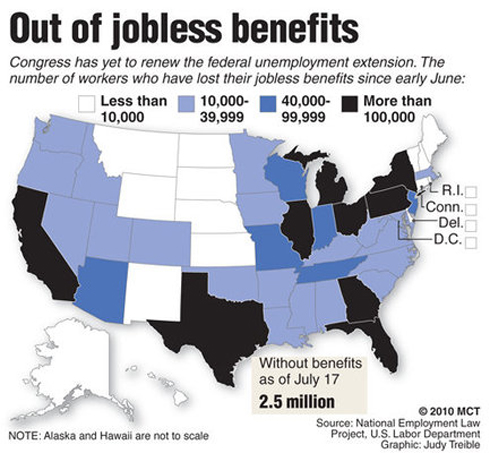Washington – It’s been about six weeks since funding for extended jobless benefits expired, and by the end of this week, an estimated 2.5 million people will have lost federal aid.
Although Congress returned Tuesday from a 10-day Independence Day break, those jobless workers will have to wait at least a few more days before they get help.
A new vote is expected, but probably not until next week, when a new senator from West Virginia is expected to be seated — and provide the 60th vote Democrats need under Senate rules to move the measure forward.

Meantime, the months-long debate keeps raging. Senate Majority Leader Harry Reid, D-Nev., told colleagues Monday evening about a Nevada man who “will not get rich off his unemployment check, but it might help him keep a roof over his head.”
Republicans such as Sen. Orrin Hatch, R-Utah, saw the issue differently.
“I didn’t hear a word back home about this,” he said Tuesday. “People in Utah are independent. They’re more concerned about deficit spending and how this country is going bankrupt.”
That, in a nutshell, is driving the deadlock that’s prevented Congress from approving the extra benefits — an act that should be easy with congressional elections in less than four months and polls showing that constituents say jobs should be Congress’ top priority.
Instead, money for extended benefits began running out in early June. Since then, Republicans and moderate Democrats balked out of concern that more benefits would increase the federal deficit. Lawmakers from lower-unemployment areas didn’t feel much urgency. Conservatives also insisted that an extension of benefits would discourage people from seeking jobs.
A breakthrough is expected shortly. Senate Democrats last month fell one vote short of cutting off extended debate on a $33.9 billion, six-month extension. The party controls 58 seats, and West Virginia Gov. Joe Manchin, a Democrat, is expected to name a successor to the late West Virginia Sen. Robert Byrd by early next week.
Supporters expect their new colleague will be the 60th vote. Two Republicans, Maine’s Susan Collins and Olympia Snowe, sided with the Democrats last month, while Sen. Ben Nelson, D-Neb., voted with the GOP. (Reid switched his vote to no so he could ask to reconsider the bill later.) If the Senate passes the bill, it would need approval by the House of Representatives, and that’s expected quickly.
Meanwhile, Maurice Emsellem, the policy co-director at the National Employment Law Project, which advocates for the jobless and provided the estimate of affected jobless workers based on government data, said that Congress’ inertia has affected two types of unemployed people: Those whose initial 26 weeks of state benefits have expired, and those who can qualify for a new “tier” of extended benefits.
The worse a state’s jobless rate, the more tiers of benefits a jobless worker can qualify for. The maximum number of weeks is 99. The average benefit, which can vary dramatically from state to state, is about $300 a week.
Leading Democrats renewed their push Tuesday for the benefits.
“The unemployment insurance extension is one of the biggest boosts you can give to the economy . . . people who get that money will spend it immediately,” said House Majority Leader Steny Hoyer, D-Md.
Boosting their point is testimony earlier this year by Douglas Elmendorf, the director of the nonpartisan Congressional Budget Office. He told Congress’ Joint Economic Committee that emergency unemployment benefits would be both “timely and cost-effective in spurring economic activity and employment.”
However, Michael Tanner, a senior fellow at the libertarian Cato Institute, argued that the money spent today on jobless benefits “will have to be paid back by taxing workers and employers down the road. This slows economic growth and leads to fewer jobs in the future.”
Hoyer said that deficit spending in a sluggish economy is a much-needed boost, and the time will come later for deficit reduction.
Tanner offered a favored conservative argument: “Extending unemployment benefits increases unemployment and keeps people out of work longer,” he said, “because workers are less likely to look for work, or accept less-than-ideal jobs, as long as they are protected from the full consequences of being unemployed.”
Nonsense, countered Sen. Sherrod Brown, D-Ohio. “This is not welfare,” he said. “This is insurance.”
On The Web:
CBO Director Elmendorf on jobless benefits
Cato Institute study of jobless benefits
Senate roll call vote on jobless benefits debate
Join us in defending the truth before it’s too late
The future of independent journalism is uncertain, and the consequences of losing it are too grave to ignore. To ensure Truthout remains safe, strong, and free, we need to raise $24,000 by the end of today. Every dollar raised goes directly toward the costs of producing news you can trust.
Please give what you can — because by supporting us with a tax-deductible donation, you’re not just preserving a source of news, you’re helping to safeguard what’s left of our democracy.
